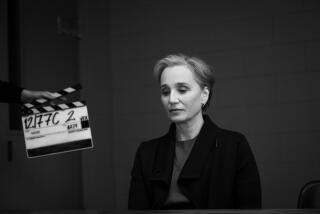âL.A. Cafeâ a breakfast stop that has cachet
Political Hollywood is a fairly small place -- more a neighborhood than a town, really. Everyone knows where you go for endorsements and where you go to raise money. But when it comes to raising consciousness, the top stop is Heather Thomasâ breakfast salon.
In fact, the monthly gatherings the actress-turned-philanthropist and novelist holds in her sprawling Spanish-style home in Santa Monica have become a mandatory meeting place for movie producers, progressives and activists from across the country eager to make a Hollywood connection.
Thomas and her husband, entertainment lawyer Skip Brittenham, were strong supporters of John Edwardsâ presidential candidacy, rallying the senatorâs local loyalists in their vast backyard. (Of course, other politicians have made the rounds there over the years -- Sen. Barbara Boxer, House Speaker Nancy Pelosi, former Rep. Harold Ford. Enough money has been raised on the coupleâs estate to fund a small country or a âTitanicâ sequel.)
But the main focus of Thomasâ efforts is her political assemblee, complete with full breakfast. The gathering -- which Thomas started in 2003 in her living room -- has now become so well-known in the national political community that it has a name in Washington: âThe L.A. Cafe.â
âIt has cachet,â said Jennifer Palmieri, the senior vice president for communications at the Center for American Progress, who flew in from D.C. this week to see Thomas and pitch her latest venture: a new website called the Wonk Room, a clearinghouse for left-leaning material.
The idea of the Hollywood salon has deep roots. Paul and Mickey Ziffren hosted highly influential weekend meetings in Malibu in the â70s where stars, executives and candidates could mingle. Norman Lear hosted his legendary Sunday evening salons in the screening room of his Brentwood estate, also during the â70s, where invitees could include sitcom writers and sitting presidents.
Thomas, who traveled to Central and South America on childrenâs causes between filming episodes of âThe Fall Guyâ in the 1980s, has been happy to take on the role of political hostess and provocateur for the new millennium. She believes that entertainment industry politicos became complacent during the Clinton years. They needed a place to meet and be reinspired, she decided.
âWe needed to organize,â she said in an interview. âI wanted to take a net and gather all the grass-roots organizations. Itâs like saying, âWeâve got a barn and a blanket. Letâs talk.â We needed the centralization, and we needed a place where people could find funds for their ideas.â
Thatâs one of the things that makes the L.A. Cafe different from other political meetings: Itâs a place where people make practical connections, not just pitch or listen to new ideas. The setting evokes old money with a Hollywood pedigree -- high green hedges, tall gates and a long drive down to a two-story Spanish revival home, complete with Tiffany lamps, California plein-air paintings and couches on which people such as Edwards and Gloria Steinem have made themselves comfortable.
This week, Thomas played hostess to 70 people who had come to hear not only Palmieri but also John Tickell, who was there to talk about his new environmental documentary, âField of Fuel,â and Kelly Candaele, the founder of an L.A. think tank, Horizon Institute, which focuses on union organization and living wages, among other things.
Also, there were a number of regulars -- among them, Barack Obama supporter Victoria Hopper (married to actor Dennis Hopper), Balcony Films exec Julie Bergman-Sender and CODEPINK founder Jodie Evans.
âI live for these mornings,â said Stephen Nemeth, founder and chief executive of Rhino Films. âThey are literally the most important gathering of people that Iâve ever been a part of. Everyone in the room is just a phone call away from anyone on the planet we need to talk to. One of the things thatâs great about Heather is sheâll say, âOh, you need to get to the director of health and human services? OK. Or, you need to talk to Desmond Tutu? We can get to him.â She has no fear, nor do any of us, about using each other to get to a better place.â
They chat, they exchange numbers and cards. They eat pastries, sip fair-trade coffee. Some stay for hours. As the last guest left this week, Thomas took a break in a secluded courtyard. Her schedule has been packed. (Sheâs getting ready to promote a novel she wrote about politically active Hollywood wives, called âTrophies,â and itâs a roman a clef, of course.)
Readers shouldnât expect a satire, however. Thomas wrote the book with a strong point: Much of the industryâs charitable and political giving is driven by the mogulsâ wives. They are a force of their own.
âThey have the money and the time,â Thomas said. âWhat are you going to do? Youâre going to change the world.â
--


